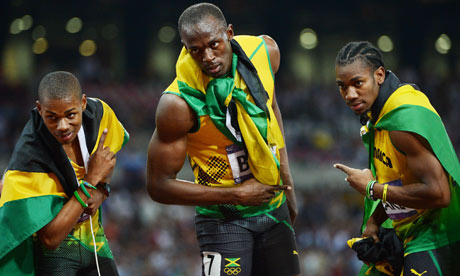
From mocking Aidan Burley to working out that Yorkshire won more gold medals than Spain, Twitter was a great place to be during the Olympics. We saw Team Rwanda at a bus stop; passed around videos of Chad le Clos chatting and Denise Lewis jumping on a chair.
The social networking site calculated that more than 150m tweets about the Games went out during the fortnight, with more than 80,000 a minute prompted by Usain Bolt's win in the 200m sprint. Even the grumpiest sports haters (yes, I'm talking about me) became infected with the Olympic spirit. I became genuinely emotional as the Chinese hurdler who injured his achilles tendon at the starting blocks limped the entire course. Sport has never done that to me before.
So, Twitter loved the Olympics. What was perhaps more surprising was how quickly the athletes took to the medium – and it took to them. Tom Daley has added more than a million followers since the beginning of July and Jessica Ennis 400,000, while Mo Farah put on 30,000 just on the day of his 10,000m triumph alone. Even those who didn't have a big public profile before the Games – such as long jumper Greg Rutherford – saw the benefit. He went from 5,000 followers in early July to more than 70,000 now. The three most popular subjects among athletes seemed to be their medals, their golden postboxes and their messy bedrooms, in roughly that order.
The question is: what happens to those numbers now? Will the thousands of people who followed the athletes in their Olympic pomp still find them interesting in their training seasons?
Their sponsors will certainly hope so. Celebrities with big Twitter followings are immensely attractive to advertisers; the accepted wisdom is that one personal endorsement from a beloved star is better value for money than larger amounts of scattershot branding. So far, we've been spared any plugs for athletes' personal sponsors because the Olympic branding rules forbid them (to keep the field clear for overall advertisers such as Coca Cola and Adidas). But these expire on Wednesday, so expect a blizzard of tweets about how Sports Drink X fuelled their medal-winning performance or Tracksuit Brand Y helped them to victory.
This return to normality will undoubtedly harshen the Olympic buzz. While many athletes are genuinely grateful to the companies that fund their training bills, there's always something unnerving about watching people sing for their supper when they're supposed to be speaking from the heart. (Who can forget the time that David Beckham crowbarred in a mention of his sponsors into the revelation that he suffered OCD? "I'll put my Pepsi cans in the fridge and if there's one too many then I'll put it in another cupboard somewhere," he told an interviewer.)
How bad will it be? Look at Usain Bolt, whose Twitter bio accurately, if immodestly, describes him as "the most naturally gifted athlete the world has ever seen". At the moment, his feed is a jolly collection of babies doing the Lightning Bolt and him hugging Jason Statham (his hero, apparently). But before the Games he was an unabashed product placement tweeter. Behold this totally unstaged photo of his fridge.
Luckily for Bolt – and his sponsors – it's much harder to lose Twitter followers than gain them, and he'll have to post a lot of pictures of soft drinks before enough people desert him to make advertisers think again.
But for anyone who isn't a global superstar, maintaining momentum will be tough, There simply isn't much interest in the long jump, for example, outside the big competitions, no matter how engaging and funny Greg Rutherford is.
Even worse for the Olympic afterglow, in a few days' time, the sports world's very own vampire squid, the Premier League, starts up again and Twitter will be alive with wall-to-wall retweets of Joey Barton quoting Nietzsche from here to 2013.
Oh well. It was nice while it lasted.
• Follow Comment is free on Twitter @commentisfree

